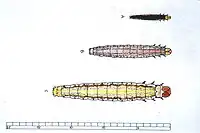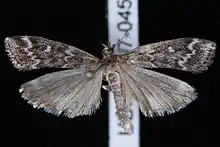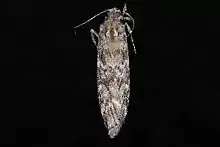Dioryctria reniculelloides
Dioryctria reniculelloides, the spruce coneworm, is a moth of the family Pyralidae. The species was first described by Akira Mutuura and Eugene G. Munroe in 1973.[1][2][3] It is found from Nova Scotia to Alaska, south in the east to New York, and south in the west to California and New Mexico.[4] It was recorded from China in 2009.[5] Occasionally abundant, often in conjunction with epidemics of the spruce budworm, the spruce coneworm (Dioryctria reniculelloides Mutuura & Munroe) occurs through most or all of the range of spruce in North America, feeding on new foliage and cones of spruce, and often balsam fir (Ives & Wong 1988).[6] When abundant, it can be a serious pest "particularly on white spruce" (Hedlin et al. 1980).[7]

| Dioryctria reniculelloides | |
|---|---|
 | |
 | |
| Scientific classification | |
| Domain: | Eukaryota |
| Kingdom: | Animalia |
| Phylum: | Arthropoda |
| Class: | Insecta |
| Order: | Lepidoptera |
| Family: | Pyralidae |
| Genus: | Dioryctria |
| Species: | D. reniculelloides |
| Binomial name | |
| Dioryctria reniculelloides Mutuura & Munroe, 1973 | |
The wingspan is 9.5–11 mm.[8] The forewings are brownish grey with black zigzag lines, bordered by white. The hindwings are light brownish grey with a pale fringe. Adults are on wing from June to August in one generation per year.
The larvae feed on Picea, Pseudotsuga menziesii, Tsuga, Abies and Pinus contorta. They generally feed on the cones of their host plant, but are occasionally also found on shoots and needles. Larvae of the spruce budworm sometimes cause superficial damage on cones, but their effect on the seed crop is minimal (Ives & Wong 1988),[6] at least in central Canada. Capable of causing less than 10% of a seed crop, the larvae of the cone cochylid (Henricus fuscodorsana Kearfott) feed in the cones, damaging scales and seed (Hedlin et al. 1980).[7] The species overwinters as a first-instar larva. Pupation takes place in late June and early July.
References
- "globiz.pyraloidea.org". globiz.pyraloidea.org. Retrieved 2011-10-07.
- Savela, Markku, ed. (January 5, 2019). "Dioryctria reniculelloides Mutuura & Munroe, 1973". Lepidoptera and Some Other Life Forms. Retrieved November 16, 2020.
- "Moth Photographers Group". Mississippi State University. Retrieved 2011-10-07.
- Contributed by Robin McLeod on 26 October 2008 - 3:01pm (2008-10-26). "Bug Guide". Bug Guide. Retrieved 2011-10-07.
- [One New Species and Three New Reco Rd Species of the Genus Dioryctria Zeller In China (Lepidoptera , Pyralidae , Phycitinae)]
- Ives, W. G. H. & Wong, H. R. 1988. Tree and shrub insects of the prairie provinces. Gov’t Can., Can. For. Serv., Edmonton AB, Inf. Rep. NOR-X-292. 327 p. [Coates et al. 1994]
- Hedlin, A.F.; Yates, H.O.; Tovar, D.C.; Ebel, B.H.; Koerber, T.W.; Merkel, E.P. 1980. Cone and seed insects of North American conifers. Can. For. Serv./USDA For. Serv./Secretaría Agric. Recursos Hidráulicos, Mexico. 122 p. [A publication instigated at the 10th meeting of the Study Group on Forest Insects and Diseases, North American Forestry Commission, FAO, held in Canada in 1974]
- "Species Details Dioryctria reniculelloides". University of Alberta Museums. E.H. Strickland Entomological Museum. Retrieved November 16, 2020.